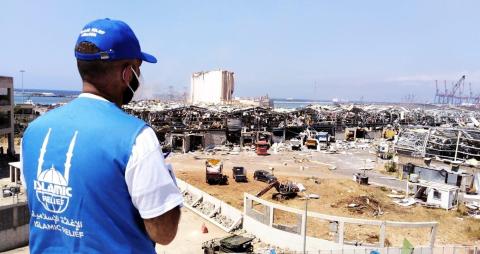
The widespread devastation in Beirut from the Aug. 4 twin explosions on its dockfront has Lebanon requiring urgent aid and relief efforts to support ongoing recovery efforts. That Middle Eastern country's political and economic turmoil and response to the global COVID-19 spread was compounded by residents of Beirut suddenly having to pick up the pieces of their lives amid a broken city.
The immediate impact of the Beirut blasts was around 200 deaths and around 6000 injuries, and over 300,000 people left homeless and unable to secure full health care at over-crowded hospitals, according to a Government of Canada website.
Before the Beirut blasts, Lebanon was already weighed down by having to care for around 1 million Syrians seeking refuge from their country's ongoing civil war.
Besides an immediate $5 million in emergency assistance contributed to Lebanon, the federal government in Ottawa created a Lebanon Matching Fund. For every eligible dollar donated between Aug. 4 and 24 by individual Canadians to the Humanitarian Coalition -- which combines fundraising for leading Canadian international aid agencies -- the Government of Canada will provide the equivalent to the Humanitarian Coalition, up to a maximum $5 million, for emergency assistance to Lebanon.
Samaritanmag.com has also made a list of five Canadian international aid agencies that are part of the Humanitarian Coalition and which people can support as Lebanon struggles to rebuild:
World Vision Canada is in Beirut helping vulnerable children and families to rebuild their lives by meeting a shortage of food and basic supplies that reach their country through the destroyed portlands.
"The port area, where the explosion occurred, is a key hub for bringing in and housing vital stocks, such as essential food supplies and fuel. A shortage of these basic supplies will be devastating for Lebanese and refugee families that live in Beirut and throughout the country," Lindsay Gladding, director of fragile and humanitarian programs at World Vision Canada, says on the charity's website.
Care Canada had teams on the ground in Beirut from August 7, working with local partners to distribute food packages and hot meals to those left homeless, including women and young girls.
"Care will also work towards longer-term assistance through shelter rehabilitation, technical support and cash assistance, long-term psycho-social support and resources to help protect against gender-based violence, which can increase after a crisis such as this as tensions increase and thousands are living in temporary and unprotected shelters," the charity says on its website.
Oxfam Canada is also working with local partners to offer clean water, sanitation services and financial assistance to Beirut residents devastated by the twin blasts and facing human challenges for years to come.
“People whose homes have been damaged or completely destroyed will not be able to access their money to start to repair or rebuild, and essential items like wheat and medicine will soon be scarce, as the Port of Beirut, the major storage and supply point, has been obliterated. A massive effort will be required to recover," Oxfam Lebanon policy lead Bachir Ayoub explains on the Oxfam Canada website.
Islamic Relief Canada has its own teams in Beirut focused on offering food, water and shelter as part of its immediate emergency response.
"The initial response will focus on distributing ready to eat meals, hygiene kits and health assistance supporting people in urgent need of humanitarian assistance who are currently sheltering in communal buildings such as schools, mosques and churches," IRC says on its website.
Canadian Foodgrains Bank, which offers food to people battling hunger in global crisis zones, is in Beirut offering support as Lebanon's imported food supply was virtually destroyed as it was stored at the Beirut port next to the warehouse filled with ammonium nitrate that exploded on Aug. 4.
"The heavily damaged grain silos are estimated to have held 85% of the country’s grain stocks. This will have serious implications for food availability,” says Miriam Harder, senior program officer who manages the Foodgrains Bank’s Middle East programming, on that charity's website.
NEW BALANCE